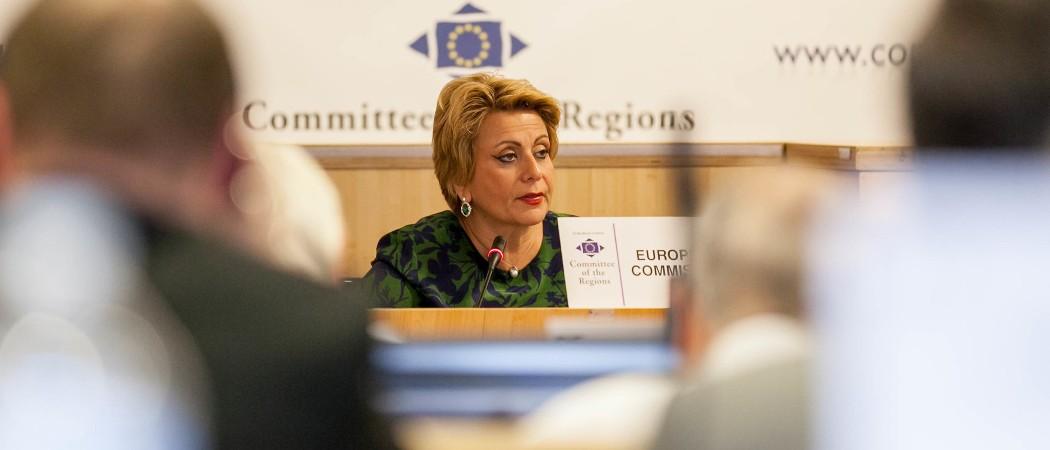During a Science|Business webcast last month, senior representatives from the European Commission and Europe’s top research labs convened for a public debate on how to stop an energy crisis becoming a science crisis

Joanna Drake, deputy director-general at the Commission’s research directorate. Photo: European Union / Nuno Rodrigues
Sky-high energy prices are worrying universities and research labs across the EU. Energy-intensive facilities such as particle accelerators and supercomputing centres are already feeling the crunch.
But research organisations everywhere are wondering how to cover huge and unpredictable rises in energy costs without taking money from research and education.
The European Commission is urgently taking stock of the impact on the research sector of rising energy prices and instabilities in the supply of key components for research facilities following from the invasion of Ukraine, said Joanna Drake, deputy director-general at the Commission’s research directorate.
And it seems that it is the only governmental body in Europe looking specifically at the crisis as it affects research. “We are at this stage not aware of any strategy at the national level to tackle this particular crisis as such,” she said. The Commission’s assessment should be concluded “in a couple of weeks”, but Drake had no firm date.
The funding of research is a national competence, so Brussels cannot step in directly. Once the stocktaking is done, the Commission will see “what leverage actions we can engage in and at what level”. That, of course, will involve consultation with Member States.
In the long term, the Commission sees the solution as coming from ramping up the production of clean energy, diversifying Europe’s gas supplies and reducing reliance on fossil fuels. “We think that research and innovation is already playing a central role there,” said Drake, adding that R&I would be central in the “Three Ds” – deployment, demonstration and de-risking.
In the short to medium term, Drake acknowledged that research infrastructures would have to cope as best they could, “being left to their own devices”.
Coping with instability
Speaking for the ALBA Synchrotron near Barcelona, director Caterina Biscari outlined the energy situation. “So far the energy crisis has been sustainable,” she said. The big question is what will happen next year with a market that is “completely unstable”.
Like everyone else, said Biscari, ALBA is working on contingency plans that could involve reducing investment. But a synchrotron cannot easily switch of operations efficiently: experiments have to run “for weeks and months”.
While the different research bodies all need to talk to their own national governments, Biscari sees a vital role for the Commission. She wants it to send a clear message to all Member States that research infrastructures are essential services for society. They should be treated as such, as they were at the height of the Covid-19 pandemic.
Sergi Girona, head of operations at the Barcelona Supercomputing Center, stressed the need for long-term planning. “We need a guaranteed budget,” he said, with limits on the cost of energy. “We want to be globally competitive. If we cannot maintain operations because we don’t have energy, it will set us back fifteen years.” Biscari agreed, calling for all of Europe’s funding agencies to “align themselves as Europe” to provide long-term stability.
A time of opportunity
The bigger the cost, the greater the opportunity, said Drake. In other words, Europe is going to have to innovate its way out of the crisis. She could not promise more money – “that’s down to Member States” – but she gave researchers a pointer for promising avenues, declaring that the Commission was “very much interested” in projects with environmental act and which develop or deploy different access modes.
While that does not offer immediate relief for cash-strapped research institutions, the concept of opportunity chimes with thinking on the research side. “We have to learn from any opportunity,” said Girona. Any crisis helps in finding solutions and developing new tools, said Biscari, pointing to experience during the Covid-19 pandemic.
The lesson, articulated by both Girona and Biscari, is that we need to work together more than we do now. “Europe needs to grow together more, not as the sum of different realities but as a reality itself,” as Biscari put it.





 A unique international forum for public research organisations and companies to connect their external engagement with strategic interests around their R&D system.
A unique international forum for public research organisations and companies to connect their external engagement with strategic interests around their R&D system.